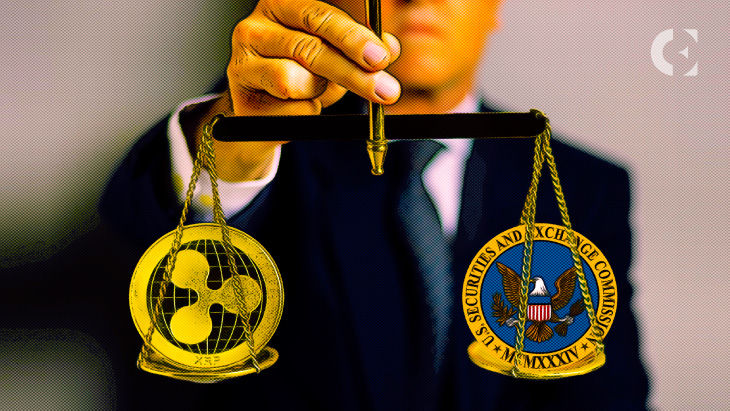Is XRP A Commodity? The SEC's Decision And Ongoing Debate

Table of Contents
The SEC's Case Against Ripple and its Arguments
The SEC's lawsuit against Ripple Labs, filed in December 2020, alleged that Ripple had conducted an unregistered securities offering through the sale of XRP. The core of the SEC's argument rested on the application of the Howey Test, a legal framework used to determine whether an investment contract constitutes a security.
-
The "Howey Test" and its application to XRP: The Howey Test considers whether an investment involves an investment of money in a common enterprise with a reasonable expectation of profits derived from the efforts of others. The SEC argued that XRP sales satisfied these criteria, claiming investors purchased XRP with the expectation of profits generated by Ripple's efforts to develop and promote the XRP ecosystem.
-
The SEC's claims regarding Ripple's sales of XRP: The SEC focused on Ripple's direct sales of XRP to institutional investors and programmatic sales, alleging these sales constituted unregistered securities offerings. They highlighted the substantial profits Ripple made from these sales.
-
The role of Ripple's network and its relationship to XRP: The SEC contended that Ripple's control over XRP's development and distribution, along with its promotion of XRP's value, created a centralized structure incompatible with a truly decentralized commodity.
The SEC's reasoning hinges on the argument that XRP’s value is inextricably linked to Ripple's actions, thereby fulfilling the criteria of a security under the Howey Test. The implications of this argument extend far beyond XRP, potentially impacting the regulatory landscape for other cryptocurrencies with similar characteristics.
Ripple's Defense and Counterarguments
Ripple vehemently defended itself against the SEC's accusations, arguing that XRP is a decentralized digital asset and not a security. Their defense strategy focused on several key points.
-
Ripple's arguments that XRP is a decentralized currency and not a security: Ripple emphasized XRP's functionality as a medium of exchange and its independence from Ripple's operational efforts. They pointed to the large and active XRP trading markets outside of Ripple's direct control.
-
Their comparison to other cryptocurrencies like Bitcoin and Ethereum: Ripple argued that XRP shares similarities with other established cryptocurrencies like Bitcoin and Ethereum, which are generally not considered securities. They highlighted the decentralized nature of XRP’s network and its use in various transactions.
-
The arguments regarding XRP's utility and market functionality: Ripple underscored XRP's utility in facilitating cross-border payments and its adoption by various financial institutions. They presented evidence of XRP's functionality as a practical tool in the global financial system, independent of any investment expectation.
Ripple's legal strategy aimed to establish XRP's distinct characteristics compared to other projects deemed securities by the SEC. Expert witnesses testified on behalf of Ripple, supporting claims of decentralization and widespread adoption, further bolstering their arguments.
The Judge's Ruling and its Implications
The judge's ruling in the Ripple case, delivered in July 2023, was a partial victory for Ripple. The court found that certain sales of XRP by Ripple constituted unregistered securities offerings, while other sales, predominantly those on public exchanges, did not.
-
Key aspects of the judge’s decision and its rationale: The judge differentiated between Ripple's institutional sales and programmatic sales, classifying these as securities offerings, while concluding that sales on public exchanges were not considered securities. The rationale centered around the degree of Ripple's control and the expectation of profit based on Ripple's efforts.
-
The impact on institutional investors and exchanges: The ruling has created uncertainty for institutional investors who previously held XRP, and exchanges must now carefully consider which transactions are subject to securities regulations.
-
The implications for future SEC actions against cryptocurrencies: The decision provides some clarity but also raises questions about the SEC’s approach to cryptocurrency regulation, highlighting the need for clearer guidelines for the classification of digital assets.
The legal ramifications are significant, potentially influencing how future regulatory efforts will approach the classification of digital assets. Appeals are possible, leading to further litigation and prolonging the uncertainty surrounding XRP's classification.
The Ongoing Debate and Future of XRP Classification
The Ripple case has fueled ongoing debate within the cryptocurrency community and the legal field. The question of whether XRP is a commodity remains contentious.
-
Arguments for and against XRP being a commodity: Proponents argue XRP's decentralized nature and widespread use demonstrate its commodity-like characteristics. Opponents counter that Ripple's initial influence and ongoing involvement suggest it falls under the definition of a security.
-
Potential future regulatory changes and their impact on XRP: Future regulatory changes could significantly impact XRP's classification and market position. Increased regulatory clarity would likely benefit the market's stability.
-
The role of international regulatory bodies: International regulatory bodies will play a crucial role in shaping future XRP regulations, with potential harmonization of approaches or a divergence of opinions.
The contrasting perspectives on XRP's classification reflect the complexities of defining digital assets within existing regulatory frameworks. Potential regulatory scenarios range from the establishment of clearer guidelines for all cryptocurrencies to the adoption of a more case-by-case approach. These scenarios will significantly influence XRP's price, adoption, and overall market standing.
Conclusion
The SEC's lawsuit against Ripple and the subsequent court decision highlight the complexities involved in classifying digital assets like XRP. The judge's ruling, while providing partial clarity, leaves significant ambiguities, particularly regarding the definition of a security in the context of cryptocurrencies. The ongoing debate reflects the difficulty of applying traditional legal frameworks to this rapidly evolving technological landscape. The arguments presented by both the SEC and Ripple, along with the judge’s decision, offer crucial insights into the future direction of cryptocurrency regulation.
The classification of XRP as a commodity or security remains a complex and evolving issue. Stay informed about further developments in the legal battle and the ongoing debate surrounding XRP classification to make informed investment decisions. Continue researching the arguments surrounding XRP as a commodity to navigate the ever-changing landscape of cryptocurrency regulation.

Featured Posts
-
 Premiere Naissance De L Annee Recompensee Par Une Boulangerie Normande
May 01, 2025
Premiere Naissance De L Annee Recompensee Par Une Boulangerie Normande
May 01, 2025 -
 France Vs Italy Duponts Masterclass Dominates Rugby Match
May 01, 2025
France Vs Italy Duponts Masterclass Dominates Rugby Match
May 01, 2025 -
 Amanda Holden Supports Davina Mc Call Following Brain Tumour News
May 01, 2025
Amanda Holden Supports Davina Mc Call Following Brain Tumour News
May 01, 2025 -
 Xrp Ripple Under 3 A Prudent Investors Guide
May 01, 2025
Xrp Ripple Under 3 A Prudent Investors Guide
May 01, 2025 -
 Stroomnetaansluiting Kampen Voert Kort Geding Tegen Enexis
May 01, 2025
Stroomnetaansluiting Kampen Voert Kort Geding Tegen Enexis
May 01, 2025
Latest Posts
-
 Dallas Tv Stars Death A Tribute To An 80s Icon
May 01, 2025
Dallas Tv Stars Death A Tribute To An 80s Icon
May 01, 2025 -
 The Loss Of Another Dallas Star The 80s Soap Opera World Mourns
May 01, 2025
The Loss Of Another Dallas Star The 80s Soap Opera World Mourns
May 01, 2025 -
 A Dallas Stars Passing Honoring An 80s Tv Legend
May 01, 2025
A Dallas Stars Passing Honoring An 80s Tv Legend
May 01, 2025 -
 Death Of A Dallas Tv Icon 80s Soap Opera Star Passes Away
May 01, 2025
Death Of A Dallas Tv Icon 80s Soap Opera Star Passes Away
May 01, 2025 -
 Remembering A Dallas Legend 80s Soap Opera Star Dies
May 01, 2025
Remembering A Dallas Legend 80s Soap Opera Star Dies
May 01, 2025
